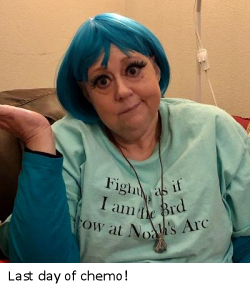

I never know where to start when telling my cancer story, which is indicative of the story itself. It is unusual, and the beginning and the ending are difficult to predict. One previous author mentioned that ovarian cancer is SNEAKY – and I agree. It is also confusing for medical providers, and based on the stories I have read here no two stories are alike.
My name is Sally Guyer, I am a social worker, college professor, business owner, and cancer survivor. I was diagnosed with ovarian cancer stage IIIC in April 2019. That was my first confirmed diagnosis but not my first ‘flirtation’ with that diagnosis.
In March of 1997 I experienced odd symptoms that I initially thought might be a kidney infection based on my lower back pain and increase in urination frequency. At one point the pain was severe enough that walking upright was nearly impossible. After a long day of unproductive tests in urgent care, followed by inconclusive ultrasounds, MRIs and CT scans, the doctors opted for an exploratory surgery. They could see things that shouldn’t be in my pelvic area, they just didn’t know what they were. The most common phrase uttered by every specialist was, “Huh, I have never seen something like that before.”
So at age 31, I had an a bilateral salpingo-oophorectomy where along with my ovaries and fallopian tubes they removed a Nerf football sized mass from my right side and a softball sized mass from the left. Initially I was told it was cancer, but further testing was inconclusive. They were never able to identify what caused the masses or what the masses were. The prevailing thought was that IF it was cancer, they had caught it in the very early stages and there was no need for chemo or other treatment. Once again all I heard was, “Huh, I have never seen something like that before.” I chalked it all up to being in a different state and not having access to a top-notch cancer center. I went on with life.
I have always been a bit of a medical anomaly and have experienced gastrointestinal difficulties since I was 4 or 5, including being diagnosed with ulcers at 8 and eventually being identified as gluten sensitive after years of discomfort and multiple specialists. So when I made poor eating choices around Christmas of 2018, I chalked my nausea and upper abdominal pain to either too much gluten or maybe a gall bladder issue. After inconclusive tests and a beautiful, pink, and healthy gall bladder (or so I was told), a colonoscopy was ordered. (I was over 50.)
I don’t remember much about the post procedure, but my friend who accompanied me is a nurse. She told me that my GI doc (who is a man of color) was quite pale when he told me that they had found some unusual tissue in my colon and were sending it for further analysis. I wasn’t worried, but I was also on a heavy dose of Ativan. When he called to tell me it was ovarian cancer, I laughed. It couldn’t be, I didn’t have any ovaries. I hadn’t had ovaries for 22 years; so clearly the tests were wrong. He was very worried because the tissue was found growing inside the colon wall, which he stated was an indicator of advanced tumor growth. He fast tracked my referrals to oncology.
I met with a few gyn-oncs, each of them approaching my case with significant trepidation and concern over how the tumor was or wasn’t presenting itself and that I wasn’t taking my diagnosis seriously. Even after the PET scan could only identify a 3cm tumor in my colon and nowhere else in my peritoneal cavity or any lymph nodes, they were all concerned that I was dying and in denial.
Turns out, we were both right. I was right because I wasn’t dying. They were right because I was probably in denial. I still find it amazing that I could develop ovarian cancer without having ovaries. No one ever mentioned that possibility to me. Nor did anyone ever mention the gastrointestinal connection to ovarian cancer. For all the years I went through medical testing for those concerns, my CA-125 level was never tested.
I had surgery in June of 2019, finished chemo in December of the same year and my most recent CA-125 level was 5. But that is not the end of my story. I have also had additional surgeries not to address cancer but to address a rather sneaky fistula that developed during my first surgery. I still have doctors and surgeons who look at my records say, “Huh, I have never seen something like that before.” Now instead of being offended or annoyed, I use that as an opportunity to begin the conversation about the need to look at patients as individuals and to think about ordering a CA125 test sooner rather than later.
I should mention that these cancers: ovarian, uterine, breast, lung, and colorectal are all present in my family. I also have family members and friends in the medical profession. While my odd health concerns were frequently discussed, the possibility or need to test for cancer was never mentioned. As a social worker, that annoys me because this is an equity issue. Women need to know about the symptoms of ovarian cancer before they manifest themselves as stage III or above. Ovarian cancer does not need to be a death sentence, nor does it necessarily need to be feared. We can all choose to not just survive but to thrive with the time we have left.
I am sure my story isn’t done – I am sure I will continue to confound and confuse medical professionals throughout the rest of my life. I am also just as sure that my inevitable demise will have nothing to do with cancer and everything to do with having lived life fully.
